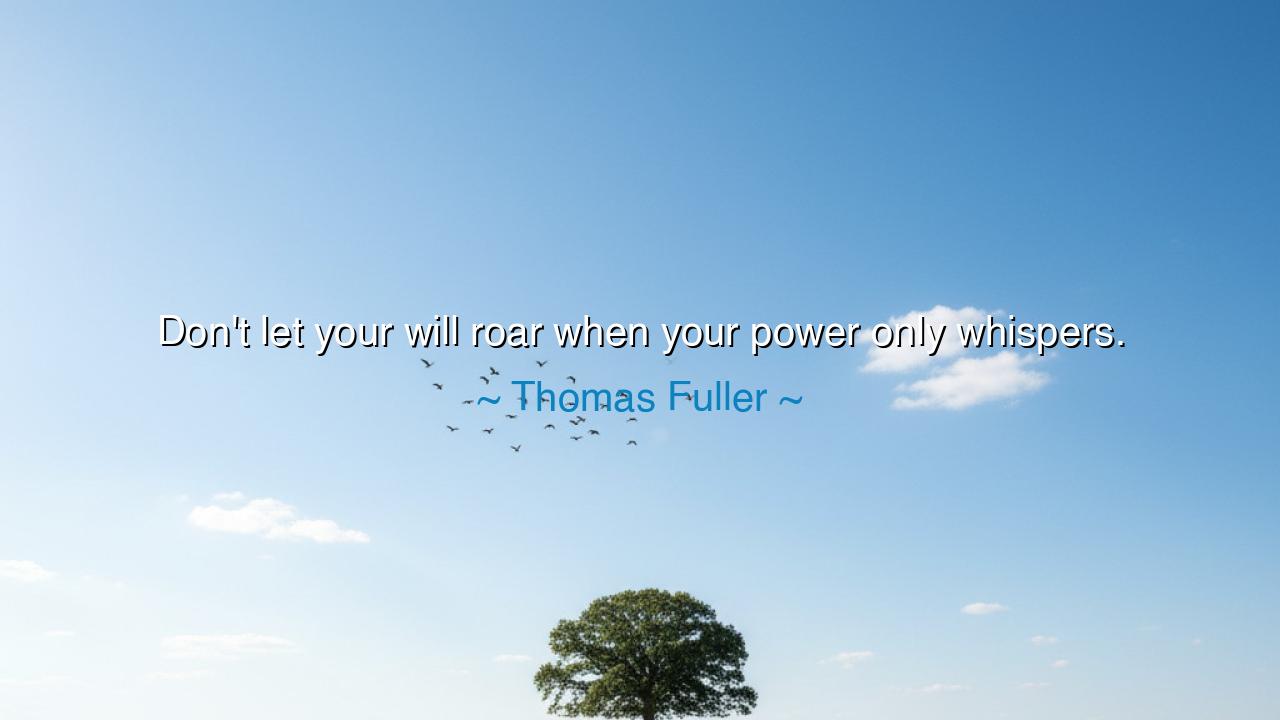
Don't let your will roar when your power only whispers.






Hearken, O children of prudence, to the warning of Thomas Fuller, who exhorts mortals to temper their will with the measure of their power. He teaches that to let one’s will roar while one’s strength only whispers is folly, for arrogance and ambition unmoored from capability invite ruin. Herein lies a lesson for all generations: wisdom lies in aligning desire with means, in tempering action with discernment, and in speaking and acting only within the bounds of one’s true capacity.
The origin of this reflection is rooted in Fuller’s life as a clergyman and moralist in seventeenth-century England, a time of tumultuous politics and human folly. Observing the countless missteps of those who overreached, who let ambition outpace ability, he distilled this truth: hubris, when combined with insufficient power, yields shame, conflict, and disappointment. Fuller’s words echo through history, urging all to consider the balance between desire and strength before one acts or speaks.
The meaning of this aphorism is profound: temperance and awareness of one’s own limits are marks of wisdom. To act with authority, to wield influence, or to assert will requires the foundation of sufficient power, whether in skill, knowledge, or resources. Without this alignment, even the most passionate intent falters, and one’s voice becomes a hollow echo, commanding attention without achieving purpose.
History provides vivid testimony to Fuller’s insight. Consider the ambitions of Napoleon Bonaparte, whose will roared across Europe. In his early campaigns, the alignment of genius and power led to triumph. Yet as his reach exceeded his resources, as desire outpaced capability, his ambitions collapsed in disaster. Here is the eternal lesson: when will outstrips power, calamity follows.
Moreover, this teaching extends to every mortal endeavor. The scholar who dreams beyond preparation, the merchant who invests without knowledge, the leader who commands without understanding—all risk the consequences Fuller warns against. True efficacy arises from harmonizing will and power, ensuring that one’s desires are backed by the strength to realize them, and that actions carry both intent and capacity.
O generations yet unborn, take this counsel to heart: measure your will against your power, and speak or act only when your strength can sustain your intent. Let your ambition be tempered by discernment, your voice guided by capability, and your deeds aligned with reality. In this harmony lies enduring wisdom, and in this balance, the path to achievement and honor is made steadfast and secure.






KGKa Giang
This quote sparks questions about strategy and timing. How can one identify when their resources, influence, or skills are adequate to act decisively? Does acting too early risk failure even if the intentions are noble? I also wonder about cultural factors: are some societies more forgiving of mismatch between ambition and power, or is the principle universally relevant? Finally, how can this insight guide personal decision-making in career, relationships, or public life?
QVvu quoc viet
I’m intrigued by the psychological dimensions of this quote. How does ego, pride, or impatience interfere with recognizing the limits of one’s power? Could mastering this balance be a key element of emotional intelligence or leadership maturity? It also makes me think about mentorship and guidance: how can leaders or teachers help others calibrate their ambitions to their capabilities without stifling creativity or initiative?
BT29. Nguyen Luong Bao Tram
This statement prompts reflection on human ambition and self-restraint. Can acting beyond one’s current power erode trust or provoke resistance from others? How does one cultivate patience and judgment to know when to act and when to hold back? I’m also curious about historical or contemporary examples where overestimating one’s capacity led to dramatic failure, versus cases where careful alignment of will and power produced successful outcomes.
DMduc manh
Reading this, I’m struck by the metaphor of a whisper versus a roar. How do subtle capabilities compare to overt displays of force or willpower in achieving results? I also wonder about the balance between caution and initiative: is there a risk of being too timid if one waits for perfect alignment of power and will? It raises broader questions about strategic thinking, humility, and the ethical use of one’s influence in various situations.
GDGold D.dragon
I find this perspective intriguing because it emphasizes self-awareness and restraint. Does Fuller suggest that restraint is a sign of wisdom and strength rather than weakness? I’m also curious about practical applications: how can one gauge whether their power is sufficient to match their intentions, and what strategies help prevent overreach? Additionally, does this advice apply to both personal and professional contexts, or is it primarily aimed at leadership and influence?